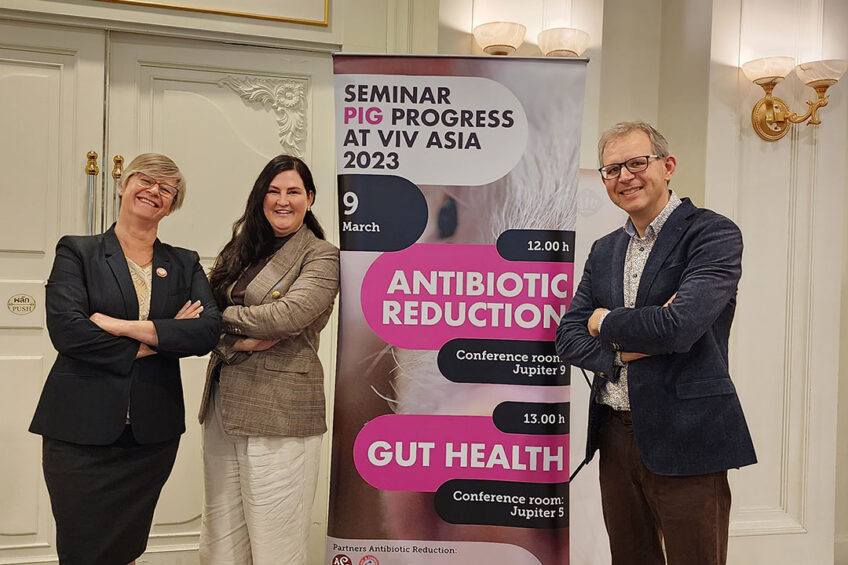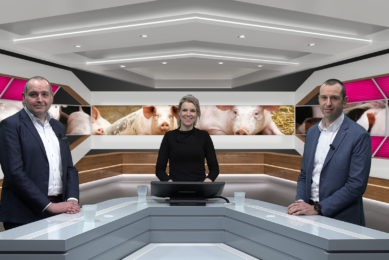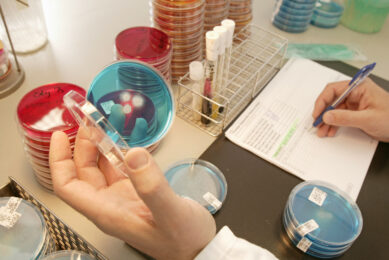On-demand: antibiotic reduction seminar at VIV Asia

During VIV Asia 2023, in Bangkok, Thailand, Pig Progress hosted an in-person seminar about antibiotic reduction. On March 9, 2023, 2 expert speakers spoke about the challenges to reduce the dependence on antibiotics, and how the pressure of both pathogenic lung and gut bacteria can be tackled alternatively. The seminar was recorded and is available for viewing on demand.
Xandra Smith zoomed in on gut problems. She is director of innovation and product development at Arm & Hammer Animal and Food Production. Introducing non-antibiotic feed additives, she discussed a 3 pillar strategy.
 3 pillars for antibiotic reduction
3 pillars for antibiotic reduction
She started to describe pillar 2, which comes down to improving the pig’s immune status. To that end, Arm & Hammer has a product called Celmanax. This is a postbiotic and prebiotic containing refined functional carbohydrates derived from enzymatic hydrolysis of yeast, combined with yeast culture. She showed that when supplying the solution to sows, their immunoresponse is triggered. This leads to more healthy sows and more immunoglobulins in the colostrum.
Pillar 3 related to targeting bacterial pathogens. To that end, she introduced the company’s approach Certillus, made from Bacillus strains. Again, when fed these strains, sows’ pathogen levels decreased – even with their piglets. The Bacillus strains can be reformulated, depending on the pathogens that are present.
Pillar 1 describes microbial succession very early in life. “Whatever bacterial species you start off with affects how that microbial succession occurs within the animal. […]. Treat the sow, and you will get healthy piglets.”
 Antibiotic reduction for respiratory health
Antibiotic reduction for respiratory health
Dr Jessica Seate, director of veterinary science at US-based company Animal Science Products, focused on the product Mucusol. Respiratory problems lead to the forming of mucus in the airways and non-productive coughs. The product is based on the gum of the guaiac, synthesised as “guaifenesin,” made water-soluble.
Dr Seate discussed a study from 2016 in Nebraska, where 25 pigs of 3 to 4 weeks of age were challenged with swine influenza virus (H1N1), and later with Pasteurella multocida. Treated pigs received 7.4 ml of guaifenesin-containing concentrate daily from day 2 of the trial to the end of study on day 8. A challenged control group received a placebo. Dr Seate showed that rectal temperature levels dropped in the guaifenesin treated group and did not reduce as quickly in the placebo group. In addition, the guaifenesin treatment resulted in fewer depressed pigs. Thirdly, nasal secretion levels were lower for the treated group. Fourth, when comparing breathing scores, the guaifenesin pigs showed better results, significant at days 3 and 8 when the pigs were euthanised. The researchers did lung scoring post mortem and found that lung lesions were a lot higher in the placebo group.
Concluding, she said that the guaifenesin approach reduces the mucus volume, and thins phlegm in the airway. This leads to an improvement of inefficient breathing.











